
Let’s be honest here. No one who knows me or has followed my reviews is going to be surprised by the announcement that I loved Wes Anderson’s The Grand Budapest Hotel. But even I’m surprised by how completely blown away I was by it. I expected to love it — with certain reservations about the lack of pop songs on the soundtrack — but not like this. It is a film that might have been made just for me. I am an easy mark for end-of-an-era stories with their inherent sadness over the passing of an age. I am also a sucker for brazenly confessional works, and Grand Budapest is the most openly confessional of Anderson’s films. Could there be a more self-aware statement than, “I think his world had vanished long before he ever entered it, but, I will say, he certainly sustained the illusion with a marvelous grace!” Doesn’t that sum up the essential mood that hangs over all Wes Anderson pictures?
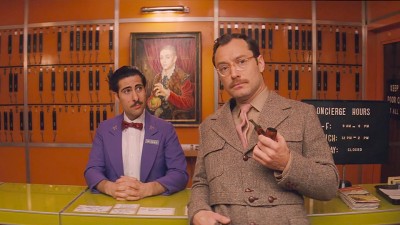
There’s more. The film, at least its central section, is like something the great Ernst Lubitsch would have made in his glory days of the early 1930s, right down to retaining the old 1.37:1 framing of that era. (The more modern sections of the film are in either 1.85:1 or full 2.35:1 widescreen.) It is set in one of those mythical European kingdoms one finds in Lubitsch’s pictures, too, and the intricate sets are designed to add to every gag and nuance. But don’t take the comparison too far. In fact, the only direct reference to classic Hollywood I caught was an usherette dressed in the same costume — right down to cape and neon wand — as worn by Margaret Sullavan in a Budapest movie palace in William Wyler’s The Good Fairy (1935). No, this is Lubitsch — or the style he helped create — as seen through an Anderson filter. It’s more manic, yet simultaneously sadder. It’s also infused with a style that has a lot to do with Richard Lester’s 1960s movies. (Anderson is perhaps the only director today, apart from Martin Scorsese, who understands how to use a zoom lens.) You will also find elements of Hitchcock’s British pictures (especially those set on trains). The result is purely Wes Anderson in its distillation.
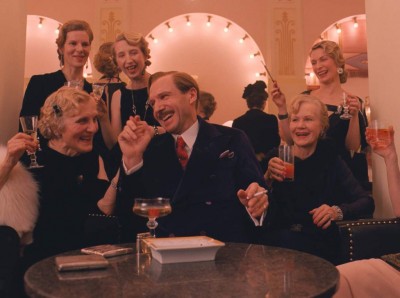
This is the first film Anderson has written without a co-writer, making it possibly his most personal work to date. It tells the story of the Grand Budapest Hotel — mostly through the story of its most dedicated concierge, Gustave H. (Ralph Fiennes), an impeccably dressed, overly perfumed man who might be said to be the spirit of the hotel. While he remains sexually ambiguous (“I go to bed with all my friends”) he has a taste for very elderly, very rich blonde women. He makes sure that everything is just right and that all the clientele — especially, those elderly, rich blondes — are satisfied. This story, set in 1932, is told in 1968 by Mr. Moustafa (F. Murray Abraham), the hotel’s final owner, to a young writer (Jude Law) during the last days of the once-great hotel. In 1932, Mr. Moustafa was merely a not-too-legal refugee and lobby-boy-in-training, called Zero (Tony Revolori). Through circumstances, Zero becomes M. Gustave’s sidekick.
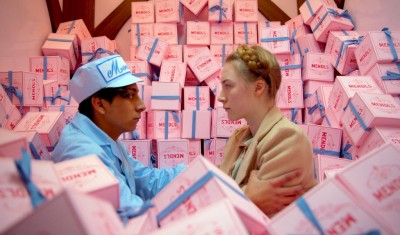
The impossibly convoluted story involves the death of one of M. Gustave’s rich blondes, Madame D. (Tilda Swinton). The death turns out to be murder, and M. Gustave is on the spot, thanks to her villainous children (headed by Adrien Brody) and the fact that she left M. Gustave a priceless (well, $5 million worth of priceless) painting. Worse, the only one who can clear him has disappeared, setting things in motion for a very wild ride indeed. Along the way, Zero falls in love with a pastry chef, Agatha (Saoirse Ronan), we see the rise of an unnamed fascist regime, witness the decay of the world of the film and get a virtual who’s who of the Anderson stock company in small roles. It’s the kind of breathless, colorful entertainment that leaves you wishing it had gone on longer than its 99 minutes.
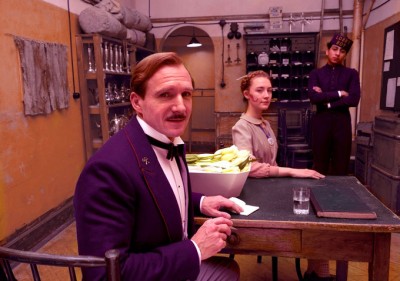
Unlike most of Anderson’s other films, there is no key moment of sadness. There’s nothing like Owen Wilson’s death in The Life Aquatic (2004), or the sequence with the drowning boy in The Darjeeling Limited (2007). Instead, the whole film is tinged with an almost unbearable sadness that colors even the most comic moments. A lot of it is due to the unlikely character of M. Gustave himself and Fiennes’ ridiculous — and ridiculously touching — performance of this fastidious, fussy, far-from-scrupulous man who spends his life looking for “a glimmer of civilization in the barbaric slaughterhouse we know as humanity.” He is brilliant, and he’s in a brilliant film that is funny, marvelously creative and always just a little bit sad. Easily the best film to come along this year — and it will probably still be at the end of the year. Rated R for language, some sexual content and violence.



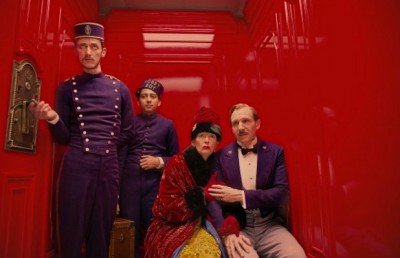
Just a note, an artistic collaborator of Andersen’s and long-time friend Hugo Guinness also has a story credit on the film.
A story credit, but not a screenplay credit.
I know some of you have seen this by now. I’m going back tonight for round two, so let’s get to the chatter.
Yes, I am working on the hopeful belief that the unusual number of cars for a weekday morning today at The Carolina were not merely people flocking to God’s Not Dead.
Decent showing at the 6:15 tonight. Laughter in the right places.
A splendid review of a splendid movie. I’ll bet the box office will increase and the movie will get legs through who’re of mouth. Best picture I’ve seen in a long time. Bravo, Wes Anderson, cast and crew. Don’t leave the theater until the Balilikas are finished at the end
I’m guessing you mean word of mouth?
Outstanding film and, just like Fantastic Mr. Fox & Moonrise Kingdom, every frame is beautiful and worth pausing for. The ski chase scene was simply delivered and far more thrilling than the usual truck load of CGI action movie crap. This will surely be high in my top ten list come December.
Maybe even better than the upcoming Sabotage. Tee hee.
No, “who’re of mouth”: positive buzz from the autocorrect-friendly South Slope hookers.
Maybe even better than the upcoming Sabotage.
There’s something…quite wrong with you.
Saw it today and want to see it again on the big screen ASAP. That brief vignette of the young lovebirds on the merry-go-round is one of the loveliest things I have ever seen and left me all verklempt.
No, “who’re of mouth”: positive buzz from the autocorrect-friendly South Slope hookers
My wife once typed in something (I don’t remember what) that was autocorrected to read “fuckweasel.”
Yeah, this was pretty much perfect and, while I guess it’s a possibility, I don’t really see how a person could dislike it. Well, okay, it’s more than a possibility, as evidenced by the gentleman who sat next to me at the screening I attended and who, immediately upon seeing that the credits had begun, angrily muttered “That was a terrible movie” before storming out of the theater. I’m not exactly sure what he expected, but he certainly felt pretty strongly about what he got.
As for me, it’ll take another viewing, but I think it may finally be the movie that usurps THE DARJEELING LIMITED as my favorite Anderson picture. If nothing else, I feel honor-bound to love any movie that features the phrase “Two Lesbians Masturbating” in its credits.
It’s definitely in the Life Aquatic/Darjeeling realm for me. I’m kind of surprised, Mr. Xanadont hasn’t weighed in on this — even though he’s been pretty scarce of late. I hope this does not mean that it disappointed him the way Moonrise Kingdom did.
I went in wanting to hate on it but I couldn’t. It was a real joy and probably his best and funniest film in quite a while.
In a zoom out, Wes Anderson
I went in wanting to hate on it but I couldn’t
Might one inquire why? (WARNING: Use of the word “twee” in your answer will result in severe reperucssions.)
In a zoom out, Wes Anderson
Although I’m not the biggest fan I put Anderson among the best filmmakers working today, and his films are always a must see, but they just don’t touch me the way they do others. I find his films to be humorous, but other than this one and Bottle Rocket none of them have really ever made me laugh out loud. I just wish he would be a little more diverse.
Somehow I just knew you’d be a fan of Bottle Rocket. I have never actually thought the point of the films was to make anyone “laugh out loud.” The real question is why you want him to be “more diverse.” I’ve never really gotten that criticism. I’ve never bought, say, a David Bowie album hoping it would be less like a Bowie album. Nor have I ever gone to — for the obvious example — a Tim Burton movie hoping it would be more like something from an impersonal director like Bret Ratner.
Hey Ken/Justin/anybody, I’m curious as to whether anybody has reviewed Terry Gilliam’s “The Zero Theorem’ (2013) yet as I’m anxiously awaiting its ‘birth’ on DVD for rental. Having searched for it here, either I’m unfamiliar with how the archived reviews work on this site or it hasn’t been reviewed yet. Any thoughts?
Sorry, yes I know I’ve hijacked this thread, now take me to Cuba.
Well, your problem is simple — the film has yet to actually have a US release. It has played only at film festivals. It’s being handled in the States by some outfit called Well Go Entertainment. I have no idea when — or if — it will show here. Until such time as it is, there won’t be a review in the archives. If it plays here, my guess is it’ll be at The Carolina. If it doesn’t play here, the Asheville Film Society will probably run it.
Perhaps the US film industry still holds a grudge against Gilliam for the Brazil debacle. He made a brilliant film, but the geniuses at Universal Pictures (who owned the US distribution rights) insisted he chop off an hour and give it a happy ending. He said screw you, and instead showed it to the LA Film Critics, who immediately declared it the best film of the year. Based on that, he was able to line up his own distribution deals, & showed his bosses out to be tasteless louts.
Bless his heart.
By Hendrix, we in the U.S. are being blockaded for new Terry Gilliam movies!
It’s bad enough that we can’t see “Lost in La Mancha” in our own homes in our boxers for lack of $ to finish the movie.
‘The real question is why you want him to be “more diverse.”‘
Just for me personally it would be more satisfying to see something different from him for a change. I guess there’s something to be said for someone who can master just one thing and stick with it.
I think you and I have contrary definitions of “different.” I find the films very different, but in a similar style. It’s much like I don’t expect (or want) an Ernst Lubitsch movie that’s like Howard Hawks. I am curious — name me the great filmmakers who have no discernible style? Who come up with a different type of movie all the time?
Sorely displeased
Getting up to Asheville was spur of the moment. My wife had to pick up a piece of furniture in Arden, and I so happened to be off from work, so we worked it out with child care (Grandmas are wonderful things) to lend us a couple extra hours to see the movie. That?s how we lucked out and got to see the first ?Grand Budapest Hotel? showing on opening day at the accustomed Fine Arts. Besides the slight time limit, I am sure if I tried to call you that I would have interrupted your viewing of ?God?s Not Dead,? and I would hate to cause you such grievances.
More on topic, favorite Wes Anderson slow-mo shot? I was also wondering if Justin had anything else to say about ?Grand Budapest? and wondered where it ranks on his own list?
I find the films very different
I agree. He follows up ‘Darjeeling Limited’ with ‘Fantastic Mr. Fox.’ Is ‘Rushmore’ the same movie as ‘Life Aquatic?’ Is ‘Royal Tenenbaums’ the same story as ‘Grand Budapest?’
Perhaps the US film industry still holds a grudge against Gilliam for the Brazil debacle
Well, he has had releases since then. Even as specialized a work as Dr. Parnassus managed a Sony Pictures Classics release. Why this is coming out through this oddball outfit, I can’t imagine.
Besides the slight time limit, I am sure if I tried to call you that I would have interrupted your viewing of ?God?s Not Dead,? and I would hate to cause you such grievances.
You stick to that story, son. (And since I saw that thing at 10:30 a.m. on a Saturday, you were wrong.)
More on topic, favorite Wes Anderson slow-mo shot? I was also wondering if Justin had anything else to say about ?Grand Budapest? and wondered where it ranks on his own list?
Give me a list of slow motion shots to choose from. As for Justin…I think we may have to wait for him to see it a second time to get an opinion.
So, Young Scott Mk. 1, where is that list?
Where is Xanadont, come to that?
Yeah, just to clarify the style hasn’t differentiated since the first film. I was hoping with Fantastic Mr. Fox he would go into new territory, which he has incorporated the stop motion stuff, and cut out stuff more. Its sort of similar to Tarantino in that they both have a distinct style, where as Tarantino’s has worn thin and Anderson’s hasn’t quite yet.
Compiling such a thing is going to take a little bit of time…
Yeah, just to clarify the style hasn’t differentiated since the first film.
Even if you’re jumping Bottle Rocket and going straight to Rushmore, I’d still disagree. To me the style has developed or grown with every film — that they remain distinctively Andersonian even so is what makes them great. Why do you want filmmakers with no identifiable voice? You could just as well watch Renny Harlin movies.
Tarantino’s has worn thin
Strange, I think his last two are his best.
Compiling such a thing is going to take a little bit of time…
Oh, but I was to answer the question off the top of my head? Uh huh.
Slo-Mo options:
-Dignan in the prison yard at the end of Bottle Rocket
-The full-cast dance at the end of Rushmore
-Margot getting off the bus and the full-cast exit from Royal’s funeral in Tenenbaums
-Zissou smokes a cigarette on the Belafonte and Zissou walks with Werner on his shoulders in Life Aquatic
-Post-sex in Chevalier
-The three Kinks numbers in Darjeeling
-Post-wedding in Moonrise
Any others?
I’m going with the second option on Life Aquatic. (Is Zissou smoking the “Life on Mars” bit?)
(Is Zissou smoking the “Life on Mars” bit?)
Yes.
I’d go with “These Days” in Tenenbaums or “Strangers” in Darjeeling, though the endings of Tenenbaums and Rushmore (my #1 and #2 Anderson films, in that order) are fine caps on excellent films.
If it’s the “Life on Mars” scene, then I don’t think that’s a cigarette.
It’s interesting that your no. 1 is — exempting Bottle Rocket — my least favorite and least watched Anderson film. (Ben Stiller factor maybe?)
More interesting to me, though, is the fact that every single scene on your list resonates in my mind — for reasons that have absolutely nothing to do with slow-motion. I’m sure that’s not true. I’m sure the slow-motion enters into why they work, but slow-motion is not what comes to mind when I think about them. It’s the feelings they evoke.
So now that someone else did the work, you’d think Young Scott Mk. 1 might at least say something.
(And, no, I have no idea why the previous post is in italics.)
Now, I have no idea how I fixed the previous post…
I’m sure the slow-motion enters into why they work, but slow-motion is not what comes to mind when I think about them. It’s the feelings they evoke.
The feelings are already there in those particular scenes. The slow-motion augments them and makes those moments even more powerful.
It’s interesting that your no. 1 is — exempting Bottle Rocket — my least favorite and least watched Anderson film. (Ben Stiller factor maybe?)
Very well could be the B.S. factor, to which I’m all but immune.
The feelings are already there in those particular scenes. The slow-motion augments them and makes those moments even more powerful.
I understand this. What intrigues me is that I don’t immediately think of them as slow-motion scenes. “Oh, that slow motion scene where…” simply isn’t in my categorization of them. I could never have made that list without watching the films again with slow-motion in mind.
That is intriguing. The slow-motion stands out so much to me.
I think I don’t because it’s so integral that I don’t break it down. It’s not showy. (And bear in mind, I am not against showy.)
It’s not showy in that it feels natural…but it is a bit of an embellishment, which I appreciate. Perhaps the slow-motion subconsciously allows these scenes to resonate with you?
It also could be that by the time we individually saw our first Anderson films, you’d seen a great deal more slow-motion shots and weren’t as impressionable? Rushmore and especially Tenenbaums are such cornerstones of my film education that I’m confident they’re responsible for shaping my cinematic outlook more than maybe any other films.
Youngster!
I’m not debating the value of the slow-motion, only noting that it isn’t what a remember about the scenes. (Except Bottle Rocket where I don;t remember the scene at all.)
You say slow-motion and the first thing that occurs to me are the horses “tip-toeing” away in Love Me Tonight, which I first saw when I was 15 or 16. That is some considerable time ago (before, I imagine, anyone even imagined your presence, come to that). You may have a point about cornerstones of film education.
(Now that you mention Moonrise Kingdom, it’s also the only Wes Anderson film that hasn’t really stuck with me. I am going to re-watch it again soon and figure out why it’s left me a little bit cold. I wonder for fans if there is that one movie in his filmography that has a similar effect.)
As it’s still fresh in my mind, I finally caught up with Moonrise Kingdom again (which has inspired the notion to watch all of his films). I must have been “in the mood” this time, for it won me over with it’s playfulness and attitude. What I figured out that leaves me cold, or doesn’t quite do it for me, are the final character arcs of Scout Master Ward, and Mr. & Mrs. Bishop. When Scout Master Ward is reprimanded and looses his badge, too quickly he redeems himself by saving Commander Pierce. It just feels so…anticlimactic. The scene with Mr. & Mrs. Bishop laying in bed discussing their broken marriage, which is a very good scene in its own right and essential to the background of the story, is a scene that still leaves me a bit unsure. Maybe because it’s easily the bleakest moment of the movie and its tone is very jarring with everything else going on, or maybe because their characters seem purposely left unresolved for the rest of the movie, leaving me wanting more. That’s really what I’m trying to say, I’m left wanting more with these characters.
My initial thoughts before seeing Moonrise again was that it didn’t do anything emotionally satisfying for me. Then at the very end, that final scene filled me with the fuzzys.
Moonrise Kingdom you’re alright by me.
you’d think Young Scott Mk. 1 might at least say something.
Thank you Mr. Arnaudin for listing off those slow motion sequences. I was about to list every scene but this is better. Just want to make sure we didn’t neglect this certain Rushmore sequence
http://www.youtube.com/watch?v=4_2gUTGjeYI
(Yes that was Spanish dubbed )
As I mentioned before, my favorite is “These Days.” Then the Who’s “A Quick One While He’s Away” that’s above, and then The Kinks “Powerman” in Darjeeling
The most impressive example of slow motion photography I ever witnessed involved a slow motion sneeze. High school biology class, no less. Complete with classical music soundtrack.
My list is the same as yours through Rushmore. At that point it becomes:
Moonrise Kingdom
Fantastic Mr. Fox
Royal Tenenbaums
Bottle Rocket
Oh and — The scene with Mr. & Mrs. Bishop laying in bed discussing their broken marriage, which is a very good scene in its own right and essential to the background of the story, is a scene that still leaves me a bit unsure. Maybe because it’s easily the bleakest moment of the movie and its tone is very jarring with everything else going on, or maybe because their characters seem purposely left unresolved for the rest of the movie, leaving me wanting more.
I believe this means it does exactly what it means to do. Plus (strokes white beard), as you saunter and stagger down the road of life you’ll ever so many things between people that are left unresolved, especially in matters like this.
The most impressive example of slow motion photography I ever witnessed involved a slow motion sneeze. High school biology class, no less. Complete with classical music soundtrack.
I think perhaps we are looking for different things here.
Strange how Ken’s movie banter comments appear here
long before criticisms of the Mountain X’s handling of ‘news’ articles. It’s almost uncanny.
The last post on the movie page was a test. Movie comments, spot on.
Comments about Mtn X turning on its own, I’ll see you in 3+ days. Same with letter to the editor.
You go Ken. Fobes, margaret, etc., Rosssebud.
Bear in mind, I’m a writer. As a writer I am constantly looking for ways to do something other than write what I should be writing, so I spend far too much time seeing if someone has said something.
Come on, folks, crank this puppy up. That God’s Not Dead thing now has more views and that shouldn’t be.
1. The Royal Tenenbaums
2. Rushmore
3. Moonrise Kingdom
4. The Grand Budapest Hotel
5. The Darjeeling Limited
6. Fantastic Mr. Fox
7. The Life Aquatic with Steve Zissou
8. Bottle Rocket
But…you are just so very wrong. Life Aquatic at no. 7? That’s…insane. And it’s wrong, too.
I used to like it so much more than I do now. For the first time in 15 or so viewings, it felt slightly off when I watched it last year.
Before Moonrise, Life Aquatic was 3/6 and Darjeeling was 5/6. I liked it so much I almost bought a pair of Zissou Adidas off eBay.
Well, maybe you were off when you watched it last year. You should watch it again. You may force me to program the film so I can make sure it happens.
You may force me to program the film so I can make sure it happens.
That may or may not have been my plan all along.
Insidious, you are.
I’d ask you for star ratings (1-5) on these, but I might have to buy my introduction to you back if you do that. Not sure I want to risk it.
Well, if we’re in the business of making lists:
1. The Darjeeling Limited
2. The Grand Budapest Hotel
3. Moonrise Kingdom
4. The Life Aquatic with Steve Zissou
5. Rushmore
6. Fantastic Mr. Fox
7. The Royal Tenenbaums
8. Bottle Rocket
Regarding the matter of favorite slow motion shots, I’m rather partial to the one in HOTEL CHEVALIER, as well as the one at the end of LIFE AQUATIC. That said, I confess that the last slow motion shot in TENENBAUMS is probably the only aspect of that particular movie that consistently lingers with me. Granted, I haven’t watched the film in a good while, and it probably deserves to be revisited.
And I have to admit that I’ve been following the comments on GOD’S NOT DEAD with a perhaps unhealthy vigor. It’s just that I’ve had a distinct interest in seeing those things lambasted ever since being unjustly cajoled into seeing COURAGEOUS a few years ago. The cajoler and I have never had quite the same relationship.
They’re all 5 star movies with the exception of Bottle Rocket, which is still a strong 4.5.
When listing your Wes ANDERSON favorites do the soundtracks match up the pretty much the same? I’ve been listening to ‘The Grand Budapest’ score and it is glorious.
Soundtracks:
1. Rushmore
2. The Royal Tenenbaums
3. The Life Aquatic with Steve Zissou
4. The Darjeeling Limited
5. Moonrise Kingdom
6. Fantastic Mr. Fox
7. The Grand Budapest Hotel (it’s great, but gimme a pop song)
8. Bottle Rocket
And I have to admit that I’ve been following the comments on GOD’S NOT DEAD with a perhaps unhealthy vigor. It’s just that I’ve had a distinct interest in seeing those things lambasted ever since being unjustly cajoled into seeing COURAGEOUS a few years ago. The cajoler and I have never had quite the same relationship.
I am compelled to ask why he (or she) wanted you to see the thing in the first place.
They’re all 5 star movies with the exception of Bottle Rocket, which is still a strong 4.5.
Not unreasonable, though Bottle Rocket is a shaky 4 for me. I can’t get away from feeling I wouldn’t be watching it at all if Anderson’s name wasn’t on it.
When listing your Wes ANDERSON favorites do the soundtracks match up the pretty much the same? I’ve been listening to ‘The Grand Budapest’ score and it is glorious.
Depends on what you mean. If you mean the scores, then not necessarily. In terms of music written for the movie, they don’t really line up. I think Moonrise Kingdom and Budapest Hotel have the best scores. If we’re talking about the use of pop songs, that’s another matter — and the last three would be at the bottom.
7. The Grand Budapest Hotel (it’s great, but gimme a pop song)
See my previous post. I don’t mind it having no pop songs any more than I am underwhelmed by the pop songs in Mr. Fox and Moonrise. I’d have to watch Bottle Rocket again to even remember its pop songs.
I’d have to watch Bottle Rocket again to even remember its pop songs.
It has some pretty good ones, namely the Stones’ “2000 Man” and “Over and Done With” by The Proclaimers.
These could easily have passed me by. I am in the marginal fan area where the Stones are concerned and I bailed on The Proclaimers after Sunshine on Leith. The next album got too preachy for me and I just never went back.
I like Mothersbaugh’s Tenenbaums work the best, followed by his Life Aquatic score (especially “Let Me Tell You About My Boat”). His Rushmore work is playful but dwarfed by the pop songs and Bottle Rocket is pretty much the same synth-and-sleigh-bells number with slight variations.
Desplat’s Fox and Budapest compositions are quite nice and I like his Moonrise pieces, too, but that’s really Benjamin Britten’s movie.
The thing about Desplat’s score for Moonrise that makes the movie appear to belong to Britten is that the new music is so completely in tune with Britten’s work. It does, however, provide its own pleasures.
Yes, but if you look at the track listings it’s almost all Noye’s Fludde or The Young Person’s Guide To The Orchestra.
But one of its central pieces is not Britten.
The six-part “The Heroic Weather-Conditions of the Universe”?
I have no clue what it’s called. I stopped buying soundtrack albums years ago.
The music when Sam is being chased through the Lightning Field?
(Should be able to play on the web without downloading the app: http://open.spotify.com/album/1B81tFGHRRdjqgAnkBhEkH)
No, it wants me to have an account.
What gets the “Young Person’s” treatment on the ending credits?
That’s Desplat’s own twist on the Bernstein’d Britten piece with Jared Gilman providing the narration. “Tympani!”
Yes, I get that, but I don’t recall that that piece is based on the Purcell themes.
Film of the year. Not that it’s had the greatest competition, but this so outstripped even the better films I’ve watched in 2014 that I fear nothing come close to equaling it within the remaining seven months.
You’re not getting an argument from me at this point.